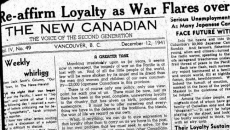Dominique Lamothe said the trucking firm she works for will be in trouble once new rules for high-wage temporary foreign workers take effect on Friday.
Groupe Nadeau, a Quebec-based trucking company, has a fleet of around 200 trucks and 1,400 trailers serviced by 70 full-time heavy mechanics. Human resources director Lamothe said half those mechanics are temporary foreign workers.
Most of them were hired through the programs' high-wage stream, which used to apply to jobs that paid a wage above the median income in that province.
On Oct. 22 Employment Minister Randy Boissonnault announced that the high-wage stream income cap would be increasing to 20 per cent above a province's median income. This is equivalent to a $5 to $8 per hour pay increase depending on the province or territory.
This change, which came as the national unemployment rate climbed to 6.5 per cent, is expected to mean that 34,000 jobs will move from the high-wage stream to the stricter rules of the low-wage stream. This includes not processing applications in areas of the country where the unemployment rate is above six per cent.
"We will not be able to renew all these work contracts because of this new law. So, if we are not able to renew the contracts, it will be 35 fewer workers in our mechanic shop," Lamothe said.
Lamothe said Groupe Nadeau would not be able to afford the wage increase to keep their 35 temporary workers' permits in the high-wage stream once they come up for renewal.
She added they would like to hire more mechanics locally, but there is a skill gap in the applications Group Nadeau is receiving.
"We're looking at every CV that we are receiving every day, but we still don't have mechanics who are applying. They're not in the six per cent who are unemployed," Lamothe said.
Coupled with Quebec immigration laws, which require a level of French proficiency for permanent residency, Lamothe said they are having a difficult time recruiting and retaining temporary workers.
The number of approved assessments in the transportation sector more than doubled since 2020, according to government data, growing to 11,106 up from 5,495 in 2020.
In the construction sector, another sector where companies are worried about the changes, approvals for temporary workers hit 15,360 in 2023, compared with 4,565 in 2020. Most of those were in the high-wage stream.
Rodrigue Gilbert, president of the Canadian Construction Association, said it's more difficult to fill construction jobs than the government believes it will be.
"We still have a major labour crisis in construction. Just right now, we have about 45,000 vacancies in the sector," he said.
"They seem to think that (the labour crisis is) phasing out, but we don't believe that at all."
He said vacancies aren't centralized around any specific job, ranging from entry-level labourer positions to skilled trades and project managers.
The government insists it's making the changes to encourage employers to hire more people who are already in Canada.
"There are Canadians, permanent residents, people living here right now who can take these jobs. What we can't allow with the temporary foreign worker program is for it to become a first resort and a means to suppress Canadian wages and overlook our talent," Boissonnault said in an Oct. 22 news conference.
Gilbert said filling construction vacancies, however, is not as simple as just showing up on a job site. Trades workers need Red Seal certification, which represents achieving the national standard of knowledge in a specific trade.
"Immigration Canada is telling us that between 2019 and 2024 they brought 50,000 permanent residents with construction experience. But having construction experience in other countries and being qualified as Red Seal in Canada, it's two different stories," Gilbert said.
"So according to our numbers, for people that use the skilled trade (permanent residency) process to enter Canada over the last 10 years, it's closer to 9,000."
These changes come at the same time the government is executing a major pivot on immigration, dropping the number of permanent residents Canada will admit by 20 per cent in 2027.
"It is such a sharp U-turn that I fear that both the car and the passenger may get significantly damaged in the process," said Sen. Ratna Omidvar.
The Independent senator, who retires this week and chaired the social affairs committee, said she understands the government's rationale for making a pivot on temporary foreign workers and immigration, but worries about the potential consequences of these actions.
"This is largely in response to the issue of available housing and access to services, which are constrained at this point. I have to agree with the findings there," Omidvar said.
"But the scale of the changes, the impact on the labour market, we might make available housing more available to Canadians, but the promise to build more housing without more workers coming into the country, I worry about the unintended near and midterm impact of these decisions."
Omidvar has her own ideas to reform the temporary worker program, focused on reducing abuse in the system. These ideas include tying permits to a sector instead of a specific employer, making surprise workplace inspections the standard and creating a commission to co-ordinate the needs of employers, workers and government.
The government appears poised to bring in further barriers to businesses applying for assessments as a next step, if the number of temporary workers in the country does not decrease as a result of these changes.
Boissonnault said he is prepared to increase the cost of these applications, which are currently priced at $1,000 per position.






